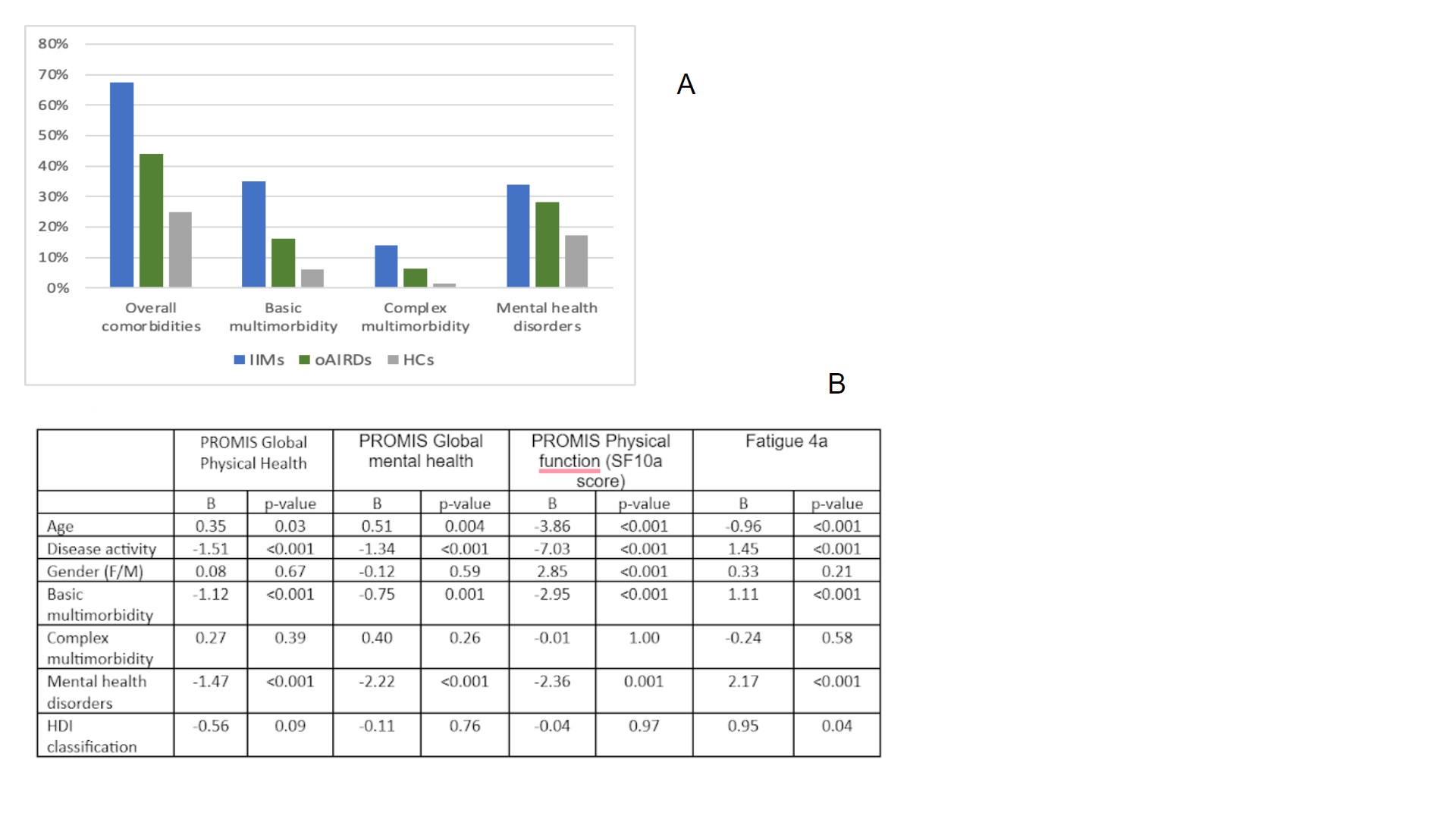Session Information
Date: Tuesday, November 14, 2023
Title: (1945–1972) Muscle Biology, Myositis & Myopathies – Basic & Clinical Science Poster III
Session Type: Poster Session C
Session Time: 9:00AM-11:00AM
Background/Purpose: Comorbidities have a profound impact on the quality of life (QoL), though global data on the burden of comorbidities and its impact on health outcomes and QoL in vulnerable groups such as Idiopathic inflammatory myopathies (IIMs) is scarce.
Methods: We studied the prevalence, distribution and clustering of comorbidities and multimorbidity among patients with IIM, AIRDs and healthy controls (HCs) and its impact on health outcomes, utilizing data from the COVAD 2 study, a global patient-reported e-survey consisting of 167 collaborators from 110 countries. Basic multimorbidity (BM) /Complex multimorbidity (CM) were defined as the co-occurrence of ≥2 non-rheumatic comorbidities & ≥3 non-rheumatic chronic conditions affecting ≥3 different organ systems1 respectively. Human Development Index (HDI) of their country was taken as a surrogate marker for socioeconomic status (SES). PROMIS global physical health (PGP), mental health (PGM), fatigue 4a (F4a) and physical function short form (SF10) were analysed using descriptive statistics and linear regression models. Hierarchical Clustering on Principal Components was performed to outline the grouping.
Results: Among 10740 respondents, 1558 IIMs (15.9%), 4591 other AIRDs (46.8%) and 3652 HCs (37.3%) were analysed. IIMs comprised mainly of DM (30.2%) and IBM (24.1%) whilst AIRDs comprised 2450 inflammatory arthritis (53.4%), 2050 CTDs (44.6%) and 235 systemic vasculitis (5.1%).
Individuals with IIMs exhibited high burden of any comorbidity (OR: 1.62 vs AIRDs and 2.95 vs HCs,p < 0.01), BM (OR 1.66 vs AIRDs and 3.52 vs HCs,p < 0.01), CM (OR: 1.69 vs AIRDs and 6.23 vs HCs,p < 0.01), and mental health disorders (MHDs) (OR 1.33 vs AIRDs and 2.63 vs HCs,p < 0.01)(FIG 1A, global distribution depicted as FIG 2)
IIM patients with comorbidities (and MHDs) had worse physical function (low PGP, PGM, SF10 and higher F4a scores, all *p < 0.001). Worse physical function (PGP, SF10a, F4a) and mental health (PGM) was predicted by age, active disease, BM, and MHDs. Worse SF10a and F4a scores were also associated with female gender and country HDI respectively. (FIG 1B)
4 distinct clusters were identified among IIMs: Cluster 0: lower comorbidity burden and good health status Cluster 1: older patients with higher comorbidity burden and poorer health status Cluster 2: patients with higher prevalence of MHDs, lower PGP, PGM and higher F4a scores Cluster 3: older patients with average comorbidity burden and good health status.
DM, Anti-synthetase syndrome and necrotizing autoimmune myopathy were similarly represented in all clusters, while IBM and PM were more pre-dominant in clusters 1 (61.7% and 45.3%) and 3(36.4 and 34.6), while overlap myositis was more represented in clusters 2 (45.4%). (FIG 3)
Conclusion: Patients with IIMs have a higher burden of comorbidities with identifiable syndemic clusters that adversely impact physical and mental health, calling for optimized approaches for holistic patient management.
References:
- Harrison C, Britt H, Miller G, Henderson J. Examining different measures of multimorbidity, using a large prospective cross-sectional study in Australian general practice. BMJ Open. 2014 Jul 1;4(7):e004694.
A: “Comorbidities in the COVAD cohort”: highlighting thier increased incidence in IIMs as compared to other AIRDs or HCs.
B: Linear regression analysis (PGP, PGM, SF10a and F4a scores in BM, CM and MHDs)
A, B, C Distribution of basic multi-morbidity, complex multi-morbidity, and mental health disorders among patients with IIMs
C: Each superscript letter indicates a subset of the 4 groups analyzed for which the means or proportions showed no difference at a significance level of .05.
To cite this abstract in AMA style:
Fornaro M, Venerito V, Iannone F, R N, Nikiphorou E, Joshi M, Tan A, Saha S, Shinjo S, Agarwal V, Ziade N, Velikova T, Kadam E, Milchert M, Parodis I, Gracia-Ramos A, Cavagna L, Kuwana M, Knitza J, Makol A, Dzifa D, TORO GUTIERREZ C, CABALLERO C, Distler O, Day J, Chinoy H, Agarwal V, Aggarwal R, Gupta L, Study Group C. Multimorbidity and PROMIS Health Outcomes in Patients with Idiopathic Inflammatory Myopathies: Analysis from the COVAD Study [abstract]. Arthritis Rheumatol. 2023; 75 (suppl 9). https://acrabstracts.org/abstract/multimorbidity-and-promis-health-outcomes-in-patients-with-idiopathic-inflammatory-myopathies-analysis-from-the-covad-study/. Accessed .« Back to ACR Convergence 2023
ACR Meeting Abstracts - https://acrabstracts.org/abstract/multimorbidity-and-promis-health-outcomes-in-patients-with-idiopathic-inflammatory-myopathies-analysis-from-the-covad-study/



